Political Prisoners (100 found)
Fear & Voting in Burma/Myanmar: 2015 Election
On 8 November, up to 32 million Burmese voters will elect representatives to fill 1,171 seats in the National and State/ Division Parliaments. Ninety one political parties will compete for 75% of seats in the legislature, while 25% remain reserved for the Tatmadaw. Despite official promises of a “free and fair” election, multiple flaws continue to undermine the credibility of the process […]
• • •UN General Assembly 2015: Updates since the 2014 UNGA Resolution on Burma/Myanmar
The Burmese authorities have failed to implement most of the recommendations from previous United Nations General Assembly (UNGA) resolutions, despite recent ones being adopted by consensus, in particular Resolution 69/248 adopted in 2014. The information presented in this briefer refers directly to the language proposed for the 2015 UNGA Resolution. In 2015, authorities continued to either fail to address, or collude in serious human rights violations, and took steps to undermine the possibility of ‘free and fair’ elections on 8 November […]
• • •Half Empty: Burma’s Political Parties and their Human Rights Commitments
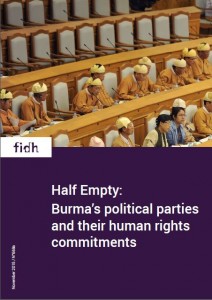 On 8 November 2015, Burma’s electorate will vote for the representatives who will sit in Parliament from 201b to 2021. The polls are anticipated to usher in a Parliament that will be markedly different from the body that was installed as a result of the November 2010 election and the April 2012 by–elections […]
On 8 November 2015, Burma’s electorate will vote for the representatives who will sit in Parliament from 201b to 2021. The polls are anticipated to usher in a Parliament that will be markedly different from the body that was installed as a result of the November 2010 election and the April 2012 by–elections […]
Presidential Hopefuls in Myanmar’s 2015 Elections
Myanmar’s General Elections being held on 8 November 2015 will determine the Assembly of the Union (Pyidaungsu Hluttaw) which comprises of the Lower House of Parliament (People Assembly, Pyithu Hluttaw) and the Upper House of Parliament (National Assembly, Amyotha Hluttaw) as well as the regional assemblies of the fourteen states and regions […]
• • •Myanmar: Freedom on the Net 2015
Internet freedom in Myanmar declined during the coverage period of this report in comparison with the progress made since the country undertook liberalization in 2011. 1 The government and security forces stepped up intimidation of internet users during social protests, intensifying conflict in ethnic minority regions, and during preparation for the 2015 national elections […]
• • •Promotion and protection of human rights, Situation of human rights in Myanmar
The Secretary-General has the honour to present to the members of the General Assembly the report on the situation of human rights in Myanmar submitted by the Special Rapporteur on the situation of human rights in Myanmar, Yanghee Lee, in accordance with General Assembly resolution 69/248 […]
• • •JADE: Myanmar’s “Big State Secret”
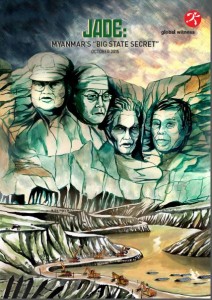 Since 2011, Myanmar’s rebranded government has told the world it is transitioning from a pariah state run by a ruthless military dictatorship to a civilian regime committed to wholesale political and economic reforms […]
Since 2011, Myanmar’s rebranded government has told the world it is transitioning from a pariah state run by a ruthless military dictatorship to a civilian regime committed to wholesale political and economic reforms […]
Myanmar: National report submitted in accordance with paragraph 5 of the annex to Human Rights Council resolution 16/21
1. During the First Cycle of UPR, the promotion and protection of human rights in Myanmar was reviewed on 27 January 2011 at the meeting of the Working Group on UPR […]
• • •Southeast Asia: Deadly Journeys – The Refugee and Trafficking Crisis in Southeast Asia
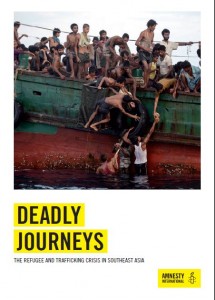 In May 2015 three boats carrying 1,800 women, men and children landed in Aceh, Indonesia. Most of the passengers were Muslim Rohingya, a persecuted religious and ethnic minority from Myanmar […]
In May 2015 three boats carrying 1,800 women, men and children landed in Aceh, Indonesia. Most of the passengers were Muslim Rohingya, a persecuted religious and ethnic minority from Myanmar […]
Report on Repressive Laws in Burma
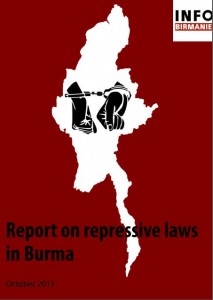 In spite of the reforms in Burma in recent years, the process of democratization has been called into question by the persistence of grave human rights violations and the absence of any significant progress on genuine democractic reforms, notably with regard to the process of legal reform […]
In spite of the reforms in Burma in recent years, the process of democratization has been called into question by the persistence of grave human rights violations and the absence of any significant progress on genuine democractic reforms, notably with regard to the process of legal reform […]

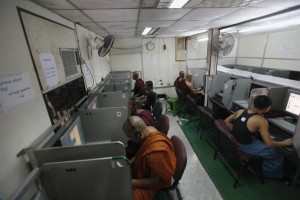
 All posts
All posts